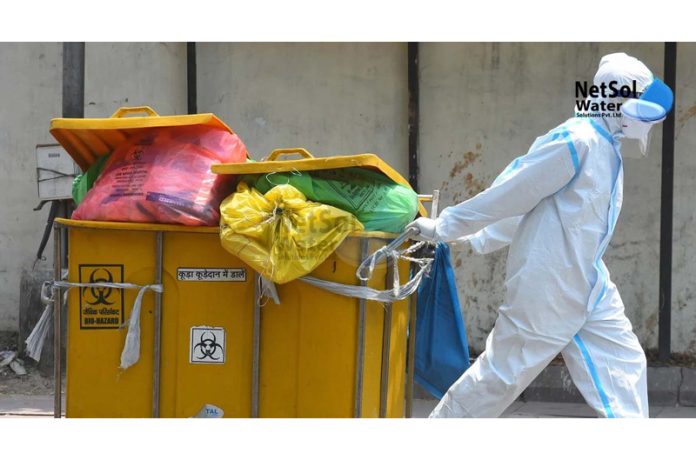Over Rs 1.64 cr penalty imposed on 4 HCFs
Bivek Mathur
JAMMU, Mar 11: Since the announcement of a countrywide lockdown in March 2020 to prevent the spread of the COVID-19 pandemic, until December 2023, the Health Care Facilities (HCFs) in the UT of Jammu and Kashmir generated 6,80,727.46 kilograms of pandemic-related biomedical waste.
This information was shared by the Jammu and Kashmir Pollution Control Committee (JKPCC) with the Central Pollution Control Board (CPCB), while complying with the directions of the National Green Tribunal (NGT) Order dated October 17, 2023, in Original Application (OA) 180/2021 titled Mukul Kumar Versus State of Uttar Pradesh & Others.
According to the JKPCC report, a copy of which is available with the Excelsior, 315,032.05 kilograms of COVID-related waste were generated by the HCFs in the UT of J&K in the period March 2020 to December 2020, followed by 308,569.52 kilograms in January 2021 to December 2021, 56,934.09 kilograms in January 2022 to December 2022, and 191.77 kilograms in January 2023 to December 2023. There are 7,671 HCFs in the UT, with 2,924 of them bedded and the remaining 4,747 non-bedded.
“In total, 680,727.46 kilograms of COVID pandemic-related waste was generated in the UT in the period March 2020 to December 2023,” read the report.
It has been further shared by the JKPCC with the Central Pollution Control Board that for non-compliance with Bio-Medical Waste Management Rules, the Committee has levied environmental compensation of Rs 1,64,54,200 on four HCFs of the UT, one among them a Government hospital.
Separately, the report said, compensation of Rs 18,28,000 was levied on SMGS Hospital, Shalamar Road Jammu, Rs 1,37,34,800 on ASCOMS Hospital, Sidhra, Jammu, Rs 7,12,000 on Maharishi Dayanand Hospital & Medical Research Centre, BC Road, Jammu, and Rs 1,79,400 on Chowdhary Hospital, Akhnoor.
The JKPCC report has further claimed that it has taken various other steps to ensure the compliance of the NGT order, including the formulation of District Environment Plans (DEPs) by all the 20 Districts with the support from the Department of Environment, Ecology and Remote Sensing (DEERS) J&K, formulation of State Environmental Plan by the Department of Ecology, Environment, and Remote Sensing J&K, holding training and sensitization workshops by the Committee (JKPCC) on Solid Waste Management, Plastic Waste Management, Hazardous and Other Waste Management, E-waste Management, and Bio-medical Waste Management, etc., constitution of committees for monitoring compliance of Common Bio Medical Waste Treatment and Disposal Facilities (CBMWTFs), as per the Guidelines for monitoring compliance of CBMWTFs, issued by CPCB.
There are three such CBMWTFs in the UT, one in Jammu and two in Kashmir. Pertinently, the three CBMWTFs operating in the UT have a capacity of treating and disposing of 26,250 kilograms of biomedical waste every day, and currently, they are treating and disposing of 8,418.53 kilograms of biomedical waste every day.


